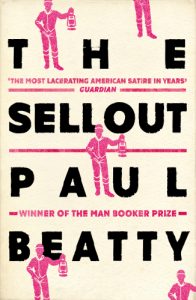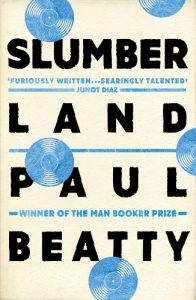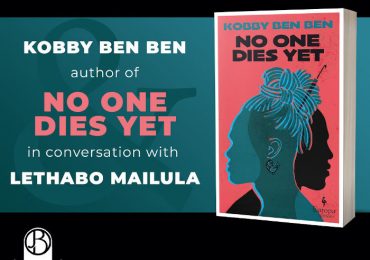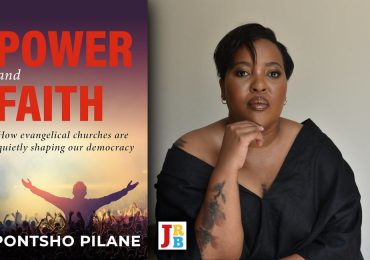 The JRB Academic Editor Simon van Schalkwyk spoke to Paul Beatty, whose novel The Sellout won the 2016 Man Booker Prize, at the Champagne Lounge at 54 on Bath, a hotel in Johannesburg. Beatty appears at the Open Book Festival this week in Cape Town.
The JRB Academic Editor Simon van Schalkwyk spoke to Paul Beatty, whose novel The Sellout won the 2016 Man Booker Prize, at the Champagne Lounge at 54 on Bath, a hotel in Johannesburg. Beatty appears at the Open Book Festival this week in Cape Town.
The Sellout
Paul Beatty
Oneworld Publications, 2016
Listen to Paul Beatty read from The Sellout
Simon van Schalkwyk for The JRB: I’d like to begin with a question about travel: you’ve been ‘on the circuit’ since you won the Booker Prize and the National Book Critics Circle Award—from a spot on Hard Talk, an interview in the Paris Review, conversations at the Jaipur Literary Festival, and the upcoming Open Book Festival in Cape Town. Do you travel frequently? How do you feel about travel in general and, more specifically, about the kinds of travelling you’ve done for The Sellout?
Paul Beatty: No, I’m not much of a traveler, really. You’ve used the perfect word, which is ‘circuit’, but I’m not on any circuit, really. It’s not that I don’t want to be on a circuit; it’s been nice to pick and choose some spots that I’ve been curious to go to but would otherwise never make the effort to visit.
The JRB: Do find that you have much time to explore the places that you’ve visited recently?
Paul Beatty: Not really. I was talking to Richard Ford about this. Somebody said, ‘Okay what you do is you plan what you’re going to do four days before you get there and four days after’, and I quickly realised I’m not going to do that. I just try to show up and see what happens. I’ve met a ton of nice people. I’ve been learning something, just don’t ask me what that is yet!
The JRB: Has the reception to The Sellout changed depending on where you’ve appeared?
Paul Beatty: Yeah, that’s a good question. It is different in different places somehow. I’m not sure how, exactly. But in India and Ireland I could hear the difference in the way that people were talking about the book. There was just like this unspoken understanding: we didn’t start from square one somehow, y’know? That was interesting. There was a little bit less permission-asking, maybe.
The JRB: Less permission-asking?
Paul Beatty: Yeah. So like one thing is—this is by no means across the board—but nine times out of ten, when I’m talking to a white guy, wherever I’m at, they have to ask me about the word ‘nigger’. I don’t mind it, but then when I see the pattern it becomes a thing, and I have to think about it. And in Ireland and India—and with other individuals, I don’t want to imply it’s just in one place—there’s a sense that you’re … not on the same page, exactly, but there’s just less explaining this or allow me to say this so that I can say that. There wasn’t that as much in India and Ireland.
The JRB: Do you think that has something to do with cultural background?
Paul Beatty: Yeah, I think that’s part of it. It’s not about who the person is or about what they look like. I think part of it is a sense of how you deal with colonialism, y’know? What does that do? When I think about this young Italian writer—I wish I could remember his name—he just had this amazingly open mind, and just read the book so openly. And that gave me another sense of comfort that I don’t normally have, and we talked about stuff that I rarely talk about.
The JRB: I’ll return to questions of travel a bit later. For now, I’d like to find out a bit more about your thoughts around the critical acclaim and awards received by The Sellout. Considering that the book shares a family resemblance with your previous novels—similar themes; similar tragicomic storylines; similar sarcastic, satirical, reference-packed style—why do you think this novel, in particular, won the plaudits that it did and drew the attention that it has on what we might call a ‘global’ scale?
 Paul Beatty: Yeah, I guess. I mean I wrote them all, so there’s got to be something there. My favourite book is Slumberland, that’s the book I love. I’m fairly aware that I’ve written a pretty good book.
Paul Beatty: Yeah, I guess. I mean I wrote them all, so there’s got to be something there. My favourite book is Slumberland, that’s the book I love. I’m fairly aware that I’ve written a pretty good book.
The JRB: I suppose what I’m wondering is whether you think The Sellout’s success has anything to do with—I don’t want to use the word ‘global’ necessarily—but with a conversation about race that seems to be far more apparent or out in the open now (and not only in America) than it has been for quite some time? Would you agree with the suggestion that The Sellout responds to or participates in that conversation?
Paul Beatty: Yeah, I agree with that. But that’s a different thing from accolades. For me this is not just about race but the nature of how we think, how we operate, what’s art. All these questions that I try to ask through the book are always there. So that part is timeless. I’d like to think that people aren’t giving me this award to make themselves feel better. And beyond that is that I know that I’ve written a good book. It’s a book that took me five years to write—it’s almost three years old now—and I think time will hash that out.
I was talking to one of the judges for the Man Booker prize, and she told me that when it came down to it she said, ‘What’s the best book? Isn’t that what we’re doing?’ No one deserves anything: you get what you get. It’s not like somebody owes me something. Although merit’s completely subjective, obviously.
But I don’t want to take anything away from what the book is. For me, it doesn’t matter whether a book is written ten years from now or ten years ago. There’s no real time reference in The Sellout. I mean, there’s some contemporary things—but just to allude to things, not to ground the book in specificity that way.
The JRB: So writers don’t necessarily write for what academics call ‘the now’?
Paul Beatty: Absolutely, I agree with that. And you know it’s funny, I got—not offended—I got a little peeved when this guy wanted me to write something about why all these books—these black books—are happening now. And in the way that the person phrased the question … it was coming from this condescending point of view. As if something happened and …
The JRB: … A particular moment suddenly authorises or justifies this kind of artwork or writing?
Paul Beatty: Yeah. I was in Jaipur on some panel and a woman asked this question about women’s fiction and everyone went, ‘You’re acting as if there’s some kind of trend where women are writing good books.’ Then it got to me and I was like, ‘Well everybody’s always been writing good things.’ Sometimes it’s just a matter of how many people are writing, how many people are allowed to write. But a lot of it’s on us as readers, as publishers, to give these things the merit they deserve and to find these things. This stuff is always there. I’d like to believe that.
The JRB: The Sellout arguably became such a success because it is so critical of the idea that we have entered a ‘post-race’ era, even though our experience presents a stark and perpetually-mediatised challenge to the claim that ‘race doesn’t matter anymore.’ What, or perhaps how, do novels add to these conversations? How, if at all, do novels differ from, say, slanted reportage; witty tweets on Twitter; longform investigative articles; academic papers; thinkpieces by Darryl Pinckney; or more deeply personal memoir-like forms such as Ta-Nehisi Coates’s Between the World and Me?
Paul Beatty: There’s a bit in The Sellout where the narrator’s talking about essays passing for fiction, that there are no absolutes. I just think all this stuff is always there. I don’t know if this is new, necessarily, but there’s this weird notion that genre is, I don’t want to say it’s disintegrating, but people are less tied to it, I think.
I was at some award ceremony [the 2014 National Book Critics Circle Awards —Ed.] and Claudia Rankine’s Citizen: An American Lyric was up for a poetry award and a criticism award! And I was like, ‘Ah, that’s smart!’
I don’t know what the novel’s place is. Getting tied to this notion of conversation: there’s an assumption about who’s having that conversation. And then all of a sudden it’s ‘a conversation’ because a certain class or a certain type of person is having that conversation, be it an academic, be it the media, whatever. I don’t subscribe to that. I think books are about conversations that individuals are having with themselves, and it’s ongoing.
Like I said, I wrote that book so long ago, and I don’t mean to make this a race-based thing. I remember this young, black journalist, and at the time the police killings and police brutality was a big thing. And he kept talking about the book in relation to that. And I think he was a little peeved with me because I was shrugging my shoulders about it as if to say, ‘This, like so many things, is just a continuum.’ But for some reason it was like a needle twitching there.
How do books play into that? I don’t know. But I try not to do that because, with any luck, I’m writing a book that people are going to be reading five years from now, fifty years from now, for whatever reason, and beyond content—content’s part of it, but hopefully they’ll be reading it for the way I write, how I write, how I think.
The JRB: I’ve seen your resistance to attempts to label or pigeonhole the novel, especially in terms of defining your style as ‘satire’. I got the impression that there was something distinctly hyper-real about the novel, something more-real-than-real. But then I stopped and thought about it and I realised that a lot of it’s actually not more real than real: the things you talk about are actually very real. So while someone reading the book might think that it’s shocking or absurd, it’s actually no more or less absurd than what’s going on everywhere and all the time. Do you think that the novel as a form allows more freedom to explore this kind of terrain, this weirdly everyday kind of ‘hyper-reality’?
Paul Beatty: I don’t think the novel necessarily gives me the freedom to do these things. I can’t speak about the novel as a form; I can speak about why it’s important to me. I think the novel allows me to sit on things in the way that I want to sit on them, that I haven’t been able to do in any other way. I think it’s similar to how some people do it in film. It’s a kind of weird way of … I was going to say something about ‘giving voice to silence’ but that’s not what I want to say either.
I don’t have a canned, witty answer, but I see what you’re getting at. It makes me think about my students and their attempts to think about what a novel does, what prose does. I think at some point I realised that they were all trying to write screenplays. I had a student once who had a really good quote that I can’t quite source at all—she said it was Sam Delany—which is something like ‘a book is more than the film inside your head.’ I say that to my students just to get them to think about it.
I tell them stories about the time I worked on a film about this old white character and this young, beautiful black woman, and they fall in love. And I had to write the love scene and I went, ‘Yeah, well, I understand why you’re in love with her … I don’t understand why she’s in love with you.’ This was with Warren Beatty and Halle Berry. And he goes, ‘Well, I put the camera on Halle, and I put the camera back on me, and I put the camera back on Halle … and the audience knows!’ And I went, ‘Yeah, you’re right!’ But I tell the students that it’s very hard to do that. Not that you can’t do that, but you’ve got to realise that’s what you’re trying to do. That space … I think that’s what I’m trying to talk about. It’s not interstitial but it’s that ability to have everything in focus and to have depth. Some people can do that on film; hopefully that’s something I can do, that I try to do, on the page.
The JRB: I can see that. I get the sense that the novel runs along multiple plotlines, all of which are set up in the sections prior to the interlude, and then picked up again and worked through, recursively, in subsequent chapters. That really adds to the stereoscopic effect of the story—it follows multiple ‘plotlines,’ but with the idea that all of these plotlines are happening concurrently.
Paul Beatty: It’s layered. The language is layered, what’s happening is layered. I think we’re very comfortable with dealing with things in their place. I never see things in this way. I just see everything impinging on everything else, and that affects how I write.
The JRB: At the same time, there’s an unevenness to those layers that I’m interested in. For example, there are a number of references to South Africa—apartheid South Africa in particular—in the novel. What are your thoughts about the idea that The Sellout tends to broach comparisons or staggered analogies between race relations in America States and South Africa?
Paul Beatty: Some of it has to do with my tendency to go to these polar places—and when I say ‘polar’ I don’t necessarily mean ‘opposite’ because sometimes these things go to here [at this point Beatty draws an imaginary circle in the air, implying that opposite points might be conjoined].
I was thinking about this today, after talking to someone about South Africa. Around the time I started getting the urge to write, when I was in grad school, I wouldn’t say I was active but I was on the periphery of these anti-apartheid movements, and I just learned so much from watching all this hypocrisy, all this contradiction between groups and in group action. And it made me think about my own sense of cowardice.
But it’s being around that stuff that’s really stayed with me. I had these great conversations with a guy called Cooper—he wasn’t in the ANC he was in … what was the other consciousness movement called?
The JRB: [with mock-surprise] Which one?
Paul Beatty: [laughs] Oh, there was a bunch of them, right? It’s so funny that there’s always a bunch of different consciousness movements!
The JRB: This is partly what I’m getting at, actually: I’m interested in how you think about that shift from a kind of Garvey-esque pan-Africanism to the more local and self-determined [Paul Beatty laughs] forms of Black Consciousness that emerged in the sixties, around the time of the Civil Rights Movement.
Paul Beatty: Yeah, I don’t think about that stuff all that much, actually. Some guy from the BBC asked me about this and he said, ‘You’re obviously celebrating Pan-Africanism.’ Now I have nothing against Pan-Africanism; it’s a part of my learning. It’s not necessarily a part of my ethos, although that’s not to say that I’m against it.
There’s a Kafka quote that really rings true to me. It’s something like, ‘What do I have in common with Jews when I don’t have anything in common with myself?’ And it’s not like I believe in that, but there’s something about that that just strikes really clarion-clear with me. And that’s where I operate. But in all that there are all these words—Jew, Consciousness—that people define differently. For me that’s really interesting. It’s about that breadth.
The JRB: There’s a clear sense throughout The Sellout that the protagonist, Bonbon, is someone struggling to find, or who has lost, a degree of commonality with any notion of the self, and that this sense of loss or uncertainty about himself prompts his attempt to reestablish some kind of community. Do you think that The Sellout depends on the tension between the self and its relationship to community?
Paul Beatty: I think that’s a good observation. The character’s dealing with it. He doesn’t really believe in community: doesn’t know where it ends, doesn’t know where it starts. Again, it’s this thing where he just kind of wades there. He exists in this place; he talks about these things; he actually draws a line. He quickly learns that the line doesn’t really distinguish anything. But there’s something about there being a line there that means something. So he’s just trying to puzzle these things out.
The JRB: At one point in the novel, Bonbon tries to get Dickens, the town that he’s from and that’s been wiped off the map, paired up with sister cities: places like Juarez, Kinshasa and Chernobyl. But none of these places want anything to do with Dickens, so Bonbon has to find urban partners from artificial, non-existent, or imaginary places instead: the set Cecil B DeMille built for the film The Ten Commandments, Döllersheim, an abandoned village in Austria that no longer exists and which was the birthplace of Hitler’s father, and the imaginary ‘Lost City of White Male Privilege’. Another analogy I had in mind when I read this was a place like District Six in Cape Town. I wonder if there’s something to be said about the idea of pinning your identity to one of these vanished places and, following Freud, internalising that lost object in a way that produces a kind of mourning or melancholia?
Paul Beatty: Maybe not strictly in that sense, I don’t think so. It reminds me of Trump: these people are mourning this mythologised Americanness that never existed. These aren’t places that I’m attached to, necessarily. In LA—I think it comes up in the book—there are these little communities that have just been vaporised to put up a baseball stadium or to make downtown ‘vibrant’ again. It’s just this weird erasure that happens all the goddamned time.
I think that one of the things that keeps these places alive for me is art. Films about these little places, there’s scholarly documentation of all these things. I don’t have any definitive statement about this, but when I was in Australia and New Zealand I noticed there are these laws now that before every public gathering or state sponsored thing they have to give this little preamble acknowledging the native peoples that were there, and it felt different in different place depending on who said what and when. And, yeah, sometimes it felt like: ‘Ha-ha we beat you!’; sometimes it felt genuine. But the same words were being used, y’know? It was interesting how the meaning changed from there being a sense of mourning or there not being a sense of mourning.
It’s all my interpretation of course, but I love the imagined past, in a weird way. What it means to people and how that shapes consciousness. It’s like religion a little bit.
The JRB: There’s something ritualistic about it. Like when the Bloods and the Crips return to particular places where Dickens used to stage or rehearse gang-fights that no longer take place, because the territory they once claimed as their own has vanished.
Paul Beatty: Yeah there’s that, but it also Balkanizes. That’s the other thing that people don’t think about: how identity is constantly shifting, constantly dividing. I had a professor who would always talk about how the attempt to unify always leads to fractionalisation. The League of Nations, The United Nations, The EU. I remember having these conversations with people at the EU and thinking, ‘Yeah these ideas are all great but at some point those lines, those divisions that are already there as borders, are really going to start to … not necessarily mean something, but people are going to feel like they mean something, like they’ve lost something.
The JRB: I want to end with a pretty obvious question. There’s a point in the novel where someone says that we still haven’t learned how to talk about race honestly. What does it mean to ‘Talk about race honestly?’
Paul Beatty: I have no clue, man! I’m not talking about race honestly.
The JRB: No?
Paul Beatty: No. I’m not saying I’m not talking about race—I am: it’s there. But that’s just because of who I am and how I see the world. One of the things I realised really early on is that everything is about race, everything is about gender. There is no universal fucking vision of everything. I don’t know what a ‘white book’ is, but you read Moby Dick or Pride and Prejudice: those are just as much about race, class and gender as anything else. I think it’s interesting: the idea that only books by certain people are about race? That’s fuckin’ bizarre and that’s bullshit. Having the discourse that way all the time, for me, is just pointless. It’s so limiting. And I’ve just learned to kind of not deal with this.
I had a kid in France say something to me that really made me feel good: he said, ‘Man, I love your books; and I usually hate American books!’ He called them ‘me-novels’ because he said you open up these books and the pages are like mirrors and everyone’s constantly looking for themselves in the book. And I was like, ‘Man, I love that!’
I’m not saying that ‘Everyone’s in every book’—I don’t want to get all Zen about it necessarily. But I loved that he said that because he’s just reading. He’s doing what I’ve had to do, for different reasons, with a book. You’ve just gotta read it.
The JRB: Paul, thank you for your candor and for being so generous with your time; it’s been an absolute pleasure.
- Simon van Schalkwyk is Academic Editor and lecturer in the English Department at Wits University.





